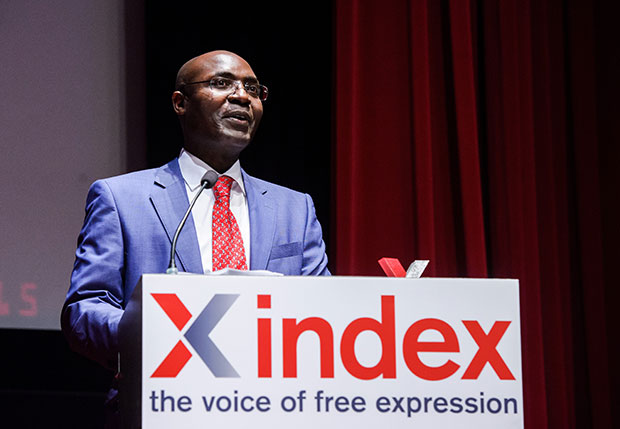Index relies entirely on the support of donors and readers to do its work.
Help us keep amplifying censored voices today.

Journalist and human rights activist Rafael Marques de Morais (Photo: Alex Brenner for Index on Censorship)
The trial of Rafael Marques de Morais, the investigative journalists who has exposed corruption and serious human rights violations connected to the diamond trade in his native Angola, will restart on 14 May. He was initially set to appear in court again on 23 April, but was informed of the postponement late in the evening on 22 April.
Marques de Morais is being sued for libel by a group of generals in connection to his work. The parties will be negotiating ahead of 14 May, to try and find some “common ground”, Marques de Morais told Index.
“In the interest of all parties and for the benefit of continuing work on human rights and for the future of the country, it is a very important step to be in direct contact,” he said.
“Rafael’s crucial investigations into human rights abuses in Angola should not be impeded by this dialogue. Index stresses the importance of avoiding any form of coercion,” said Index on Censorship CEO Jodie Ginsberg.
Marques de Morais originally faced nine charges of defamation, but on his first court appearance on 23 March was handed down an additional 15 charges. The proceedings were marked by heavy police presence, and five people were arrested. This came just days after he was named joint winner of the 2015 Index Award for journalism.
The case is directly linked to Marques de Morais’ 2011 book Blood Diamonds: Torture and Corruption in Angola. In it, he recounted 500 cases of torture and 100 murders of villagers living near diamond mines, carried out by private security companies and military officials. He filed charges of crimes against humanity against seven generals, holding them morally responsible for atrocities committed. After his case was dropped by the prosecutions, the generals retaliated with a series of libel lawsuits in Angola and Portugal.
“Despite major differences, there is a willingness to talk that is far more important than sticking to individual positions. But this cannot impede work on human rights, freedom of the press and freedom of expression,” Marques de Morais added.
This article was posted on 23 April 2015 at indexoncensorship.org
Daniel Bergner is an author and journalist who writes for New York Times Magazine; in 2005 he won an Index award for his book Soldiers of Light, which told the stories from inside war-torn Sierra Leone.
West Africa, and Sierra Leone in particular, has been receiving extensive media coverage due to the Ebola outbreak affecting the region. Bergner says that although he has been back to West Africa since writing the book, a story he was hoping to cover in Sierra Leone is “very unlikely to succeed” because of the outbreak.
Bergner’s latest book, What Do Women Want?: Adventures in the Science of Female Desire, was published in 2013 and has been translated into 15 languages.
Explore the Index on Censorship Freedom of Expression Awards
This article was posted on 23 Dec 2014 at indexoncensorship.org
Şanar Yurdatapan is a songwriter and composer who campaigns for freedom of expression, particularly against the prosecution of publishers in his home country, Turkey.
Yurdatapan won the 2002 Index award for Circumvention of Censorship, to his amusement this was the same year former Italian prime minister Silvio Berlusconi won the award for Services to Censorship.
In 2013, Yurdatapan and Index met at the IFEX General Meeting and Strategy Conference, which he attended on behalf of Initiative for Freedom of Expression; he talked to Index about the Gezi Park protests which were going on at the time. Now, Yurdatapan speaks about the positive effects of international recognition.
Explore the Index on Censorship Freedom of Expression Awards
This article was posted on 15 Dec 2014 at indexoncensorship.org
Pakistani education campaigner Malala Yousafzai will accept the 2014 Nobel Peace Prize today in Oslo. Yousafzai shares the award with Kailash Satyarthi, an Indian children’s rights activist. The ceremony can be viewed live at 11:50am GMT.
Yousafzai was awarded the Doughty Street Chambers Advocacy award based on her work at the 2013 Index on Censorship Freedom of Expression Awards.
In October 2012, a Taliban gunman shot education campaigner Malala Yousafzai in the head and chest for her activism, as she was returning home from school in Pakistan’s Swat district. After months of treatment, she returned to school in Birmingham later that year.
The schoolgirl’s father, Ziauddin Yousafzai, accepted the award on his daughter’s behalf saying:‘I want to give a message to the world. I didn’t do anything special. As a father, I did one thing, I gave her the right of freedom of expression. All fathers and mothers, give your daughters and sons freedom of expression. Freedom of expression is a most important right. The solution of any conflict is to say the right thing, to speak the truth.’
At 17, Yousafzai is the youngest ever winner of the Nobel Prize. Fellow recipient, Kailash Satyarthi has lead various peaceful protests and demonstrations, focusing on the exploitation of children for financial gain. He formed the Bachpan Bachao Andolan, translated as, Save the Childhood Movement, which combats child labour.
This article was posted on 10 Oct 2014 at indexoncensorship.org.